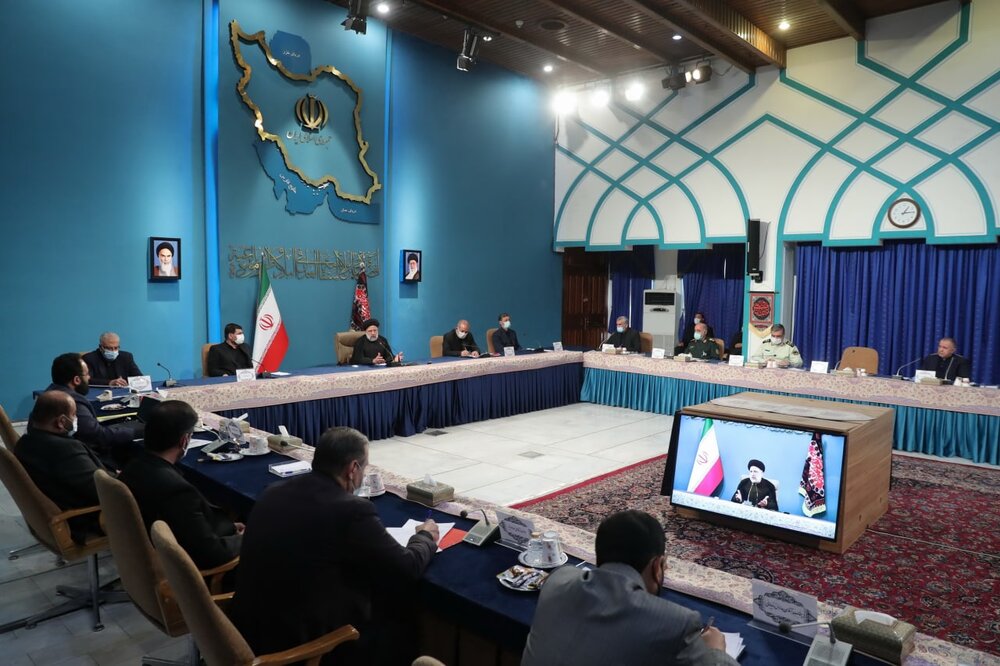Arbaeen focal point of international resistance front: Raisi

TEHRAN – Iranian President Ebrahim Raisi has said the religious pilgrim of Arbaeen is the focal point of the international resistance front in the West Asia region and the world.
Speaking in a meeting with the members of Arbaeen Central Headquarters on Tuesday morning, Raisi appreciated the measures taken by all institutions, organizations and ministries to hold this ceremony as grandly as possible.
He described Arbaeen as the guarantor of the survival of Ashura, and Ashura as the manifestation of all developments in humanity. “The movement of Imam Zain al-Abedin (AS) in founding the Arbaeen movement caused the purpose of the uprising of Imam Hussein (AS) and his comprehensive character to be explained to humanity and the source of transformation for all human beings.”
The Day of Arbaeen rolls around 40 days after the Day of Ashura, which marks the martyrdom anniversary of Imam Hussein (AS), the grandson of the Prophet Mohammad (PBUH) who was martyred in the Battle of Karbala on October 10, 680 (Muharram 10, 61 AH), nearly 14 centuries ago.
Over the past decade, the Iranian and Iraqi people have begun participating in what came to be known as the Great Walk of Arbaeen, a procession during which millions of Iranians and Iraqis travel on foot to the shrine city of Karbala, south of Iraq.
During their stint in Iraq, the Arbaeen pilgrims, including the Iranians, are usually accommodated in the personal houses of ordinary Iraqis, which have served as an occasion for the two peoples to know each other more.
President Raisi called Arbaeen the focal point of the international resistance front in the region and the world and said, “We are all obliged to make an effort to hold this ceremony regularly and without any defects as a huge movement by the Muslims of all countries,” according to official website of the Iranian presidency.
Raisi went on to say that those who cannot tolerate a hymn among different groups of the people or holding the Ghadir festival will try to prevent the Arbaeen ceremony from taking place, adding, “Undoubtedly, with the help of God and the attention of Imam Hussein (AS), as well as the determination, this ceremony will be held as grandly as possible.”
He continued to emphasize the provision of transportation, accommodation, nutrition and health of the Imam Hussein pilgrims and said, “Cheap travel and easy access to vehicles during the Arbaeen ceremony is very important and there is an expectation from us in this regard.”
Ayatollah Raisi emphasized the necessity of planning and managing the journey by the pilgrims for better service and said, “Certainly, the government and officials have the duty to provide the best possible conditions for Imam Hussein's pilgrims, but keeping this ceremony popular and using the capacity of the people, committees and popular organizations are very important in this regard.”
President Raisi emphasized the use of past years' experiences in predicting and preventing some problems that arose during the Arbaeen ritual and said, “The good work of radio and television in launching Muharram Radio and Arbaeen Radio should be developed in such a way that communication with the pilgrims will not be interrupted during the Arbaeen ceremony to transmit messages and health warnings.”
Ayatollah Raisi added, “Certainly holding this event as grandly as possible will have very positive effects for the Islamic country and will make the friends of the Islamic Revolution more hopeful and the enemies disappointed.”
Currently, Iran is in the midst of Muharram rituals. Millions of Shia Muslims in Iran and other parts of the world commemorate the first ten days of this month. During these ten days, mourners gather in settings called “Majlis Aza’a,” which means a mourning gathering and often includes two parts: the first part is held inside a mosque or Hussainiya and features a cleric reciting the virtues of the Imam while the second part features a panegyrist reciting poems to a chest-beating crowd of mourners.
Leave a Comment